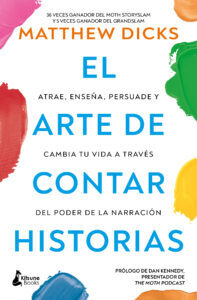Matthew Dicks's Blog, page 14
July 8, 2025
Careless whispers everywhere
I’m in the car with Elysha, Charlie, and my friend, Kaia. We’re listening to music as we make our way to Winding Trails, the lake club where we spend so many of our summer days.
George Michael’s “Careless Whisper” begins playing on the radio from one of our family’s Spotify playlists.
“I hate this song,” I announce, primarily for Kaia’s benefit. Elysha knows how I feel about this song.
I also know she likes it, which is why it’s on our playlist.
We discuss the song and George Michael for a few minutes as we make our way down Route 4 to the lake.
Half an hour later, as Kaia and Elysha enter the restroom at Winding Trails, they hear a song playing on the radio overhead.
It’s “Careless Whisper.” Again.
Elysha and Kaia tell me about the song when they return to the beach, at which point I wonder aloud if George Michael is still alive. I think he is, but Elysha and Kaia disagree. We debate for a bit before one of us finally gets a phone to confirm that George Michael died on Christmas Day in 2016. He is buried alongside his mother and his sister Melanie, who died three years after him to the day.
We also discovered that Kenny G did not play the terrible sax solo on the song. Instead, it was Steve Gregory — the ninth saxophonist to audition. Apparently, Michael was looking for something exceptionally specific in those saxophone parts, and Gregory finally found it by slowing down the song and listening carefully to Michael’s phrasing in the lyrics.
He should’ve ditched the saxophone altogether and replaced it with a guitar, though I still think the song would’ve sucked.
Six hours later, I’m sitting in my office at home when Elysha asks me to come to the living room, where she and Charlie are watching a show called “The Afterparty.” The video is paused. “You’re not going to believe this,” she says and unpauses the video.
On screen, a man stands in the rain, crying out to a woman who is walking away from him. Then “Careless Whisper” begins playing, and the man starts dancing as the voiceover expresses regret about the encounter.
I don’t know why he’s dancing. The song sucks.
But three times in one day? The song is 41 years old. Yes, we actively added it to our Spotify playlist, but then it also played in a restroom at the lake club and appeared in a television show produced in 2025.
All on the same day?
“Coincidentalism,” I say.
Coincidentalism — my personally-conceived and self-founded religion. Members of the faith (currently three in number) acknowledge and celebrate the remarkable nature of coincidences in this world while firmly rejecting the notion that a higher power is manipulating events to make them happen.While we appreciate and admire the extraordinary nature of coincidences, we also view them as expected outcomes of an unfathomably enormous and complex system of interconnected parts and endless interactions.
That is when we receive a text message from our friend, Kaia.
It’s June 26 when all of these “Careless Whisper” encounters take place.
Kaia’s text message:
“Today is George Michael’s birthday.”
Of course, it is.
Coincidentalism at its best.

July 7, 2025
Angeli’s Moth victory!
I received an email from one of my clients, Angeli Fitch, this week, along with some photos.
It read:
I got lucky…I WON!
Also: My secret weapon: Matthew Dicks
For the record:
She may have gotten lucky in terms of her name being drawn from the hat, but she did not get lucky when it came to winning.
She has been preparing for this her entire life.
As an attorney, she’s been speaking in front of people in high-stakes environments for a long time.
As a member of Toastmasters, she has been speaking and competing on stages for quite a while.
Then we started working together on storytelling, and a few months later, she won her first Moth StorySLAM.
Yes, I taught her a little bit about storytelling, but much of her success stemmed from a lifetime of preparation as a lawyer and a member of Toastmasters.
Probably other things I’m not even aware of.
She didn’t know it at the time, but her hard work and experience made her victory possible.
We often don’t know how the work we do today might yield results tomorrow, which is why we should keep moving forward, trying new things, engaging in our passions, and relentlessly looking for the next thing.
I, too, won my first Moth StorySLAM and 61 more since, alongside 9 GrandSLAM championships.
But like my client, I had also been preparing for storytelling for a long time.
As a writer, I had been deeply engaged in story for a long time.
I’d already published two novels before I took the stage at The Moth for the first time.I’d already been blogging for about six years without missing a day when I told my first story.I’d already been writing every day of my life without missing a day for almost 25 years when I shared my first story about pole vaulting in high school in the Nuyorican Poets Cafe in Manhattan.I’d spent much of my life putting sentences together long before I knew The Moth even existed.
But that’s not all.
As a teacher, I’ve made it my mission to share stories with my students as a means of teaching them that life is filled with failure, embarrassment, poor decision-making, nefarious actors, and bad luck, but we can survive it all and still thrive if we work hard, surround ourselves with good people, and keep a positive attitude.
I also told stories to entertain them. To make school fun. To make them laugh. To let them know who I am. Hopefully, to open the door for them to share their own stories as well.
I’d been performing for an audience of children – the worst audience imaginable — for more than a decade before I ever told a story at The Moth.
I had also been a wedding DJ for 14 years before I took that Moth stage. I’d stood before hundreds of audiences in venues all over New England, speaking extemporaneously to wedding guests and stripping me of any nervousness I may have had while speaking to an audience.
The Moth’s sound engineer told me after my first Moth GrandSLAM appearance that “I really know how to use a microphone.”
Years of practice at hundreds of weddings.
But I had been obsessing about stories decades before The Moth even existed.
When I was ten years old, I wrote to Stephen Speilberg, complaining about a scene in his film, “E.T. the Extra-Terrestrial.”
I still think the scene is terrible today.
Even at a young age, I was dissecting the movies I watched and the books I read, looking for things I loved and things I despised.
I also wrote all the time. As a boy, I wrote stories, essays, poems, Dungeons & Dragons adventures, songs, and political cartoons.
I wrote relentlessly.
I put in the work long before I knew I might someday take a stage in New York City and perform.
My client did the same.
The message:
March forward. Seize new ground. Acquire new skills. Amass experience. Work like hell.
It’s impossible to predict where and when these skills and experiences may help you, but simply trust they will, someday, somehow.


July 6, 2025
“Storyworthy” in Spanish!
Behold!
The Spanish version of “Storyworthy,” which translates to “The Art of Storytelling.”
Available in bookstores in Spanish-speaking nations soon!
My books have been published in more than 25 languages worldwide, yet it never gets any less exciting to think my books will be available in countries where I have yet to travel.
I wrote words in English at my desk, dining room tables, airports, McDonald’s restaurants, picnic tables, and various other places. Then, someone who I will never meet translated my English into another language so that non-English speakers could read my stories and nonfiction.
It’s astounding to me.
The world is an amazing place.

July 5, 2025
A different kind of airline passenger
On the flight back from Miami, I found myself sitting beside a couple — a man and a woman, probably in their thirties.
I was worried about them right from the start. We were sitting in row 7, just two rows behind first class, but they had made their way to the back of the plane, assuming seat numbers descended.
This isn’t a terrible mistake, especially if you don’t fly often, but to make it all the way to the back of the plane without looking up even once at the seat numbers is a little disturbing.
After squeezing through a row of passengers still heading to their seats, they finally plopped down beside me, popped an iPhone into the tray on the seatback in front of them, and began watching a movie together without headphones.
Thought it was perfectly okay to play a movie at full volume beside me.
I was listening to a book on my headphones, so the blare of their movie only penetrated my consciousness a couple of times, but still, I wondered:
“What the hell are these lunatics thinking?”
“What is wrong with people?”
“What the hell is happening to this world?”
I thought about saying something, but decided that since their movie wasn’t disturbing me, I would ignore it.
We needed to share the same space for the next two hours, so why create animous when it wasn’t necessary?
Little did I know that things were about to get a lot worse and very awkward for me.
An hour or so into the flight, the sound of their iPhone had disappeared, so I turned to see if they had decided to put on headphones and behave like civilized people, but instead, I saw that the iPhone was turned off, and they were making out.
Really making out. Hands and all. The kind of making out that often precipitates the removal of clothing.
I opened my mouth to say something, but shockingly, couldn’t find anything to say.
This almost never happens to me.
So instead, I turned, closed my eyes, and returned to my book.
But again, I wondered:
“What the hell are these lunatics thinking?”
“What is wrong with people?”
“What the hell is happening to this world?”
Love is beautiful.
Passion is admirable.
Time and place are advisable.
Selfishness and incivility can make this uncomfortable.

July 4, 2025
Thoughts on today’s Fourth of July
I’ll never understand the fascination of some people with lighting their own fireworks, which are always subpar in comparison to the real thing and occasionally result in serious injuries, permanent maiming, and house fires. If you plan on purchasing and setting off your own fireworks today, reconsider your life choices.
When I was growing up in Massachusetts, the purchase or ownership of fireworks was illegal. This, in my mind, made a hell of a lot of sense, even as a child. It was exceedingly rare to see anyone set off their own fireworks, and when it happened, we knew those fireworks had been purchased in New Hampshire by an idiot in desperate need of attention.
Only 58% of Americans understand what actually happened on July 4, 1776 (which is almost nothing since the vote for independence was actually taken on July 2, 1776), but still… c’mon people. You should know what we’re celebrating today.
Presidents Thomas Jefferson, John Adams, and James Monroe — Founding Fathers who all played important roles in the Revolutionary War — died on July 4. I don’t support death, but if you’re going to die, I appreciate a well-timed demise.
My favorite Fourth of July celebrations took place on my grandparents’ farm. I grew up next door to my grandparents, and nothing was better than smelling the burgers and the hot dogs from our backyard and running up the hill to celebrate.
Please take a moment today, amidst the parades, fireworks, and hot dogs, to reflect on the sacrifices made by our Founding Fathers, who built this country through sweat, blood, and determination. As for me, I’ll be thinking about Samuel Whittemore, who might just be the toughest old guy in the history of the world.
Born in England in 1694, Whittemore went to North America in 1745 as a captain in the British army, where he fought in King George’s War (1744-48) at the age of 50 and the French and Indian War (1754-63) at the age of 64.
Then on April 19, 1775, at the age of 80, he engaged British forces returning from the Battles of Lexington and Concord at the onset of the Revolutionary War.
Whittemore was in his fields when he spotted an approaching British relief brigade under Earl Percy, sent to assist the retreat. Whittemore loaded his musket and ambushed the British from behind a nearby stone wall, killing one soldier. He then drew his dueling pistols and killed a grenadier and mortally wounded a second. By the time Whittemore had fired his third shot, a British detachment reached his position; Whittemore drew his sword and attacked. He was shot in the face, bayoneted thirteen times, and left for dead in a pool of blood. He was found alive, trying to load his musket to fight again. He was taken to Dr. Cotton Tufts of Medford, who perceived no hope for his survival. However, Whittemore lived another 18 years until dying of natural causes at the age of 98.
In 2005, Whittemore was proclaimed the official state hero of Massachusetts. Not bad, considering this is a state that produced such wartime heroes as Paul Revere, Israel Putnam, John Hancock, Robert Shaw, and John Kennedy.
All great men, but if I were sent to war, I’d choose Samuel Whittemore to stand on my side above them all.
Happy Fourth of July, everyone.

July 3, 2025
Banter is beautiful
A while ago, I teased a student at my school.
Perhaps I was a little too mean.
In response, a handful of my students demanded that I send an apology note to the victim of my words, because, according to them, I had gone over the line.
Sweet but annoying.
Grudgingly, I sent the apology.
I received this in return:
___________________________
Dear Mr. Dicks.
It’s okay, but keep teasing me. Please because if you don’t tease me, I have no reason to prank you and laugh with you and try to make you mad and tease you back! And that’s a fun thing. It makes school fun. It makes me love school even more. And I know you’re kidding! I’m not dumb!
___________________________
See?
She gets it.

July 2, 2025
Coincidentalism!
While we appreciate and admire the extraordinary nature of coincidences, we also view them as expected outcomes of an unfathomably enormous and complex system of interconnected parts and endless interactions.
Our belief can be boiled down to:
Coincidences are amazing! Also expected! Because math!
This doesn’t mean you can’t also hold some kind of religious belief. It simply means that coincidences are not a sign or signal of a higher power. They are glorious and astounding and should be celebrated, but they are also the natural consequence of our impossibly labyrinthine world.
Or, as Elysha proposed, perhaps we are really living in a simulation, and these moments represent tiny glitches in the code—infinitesimal mistakes in the endless string of ones and zeroes that create us and our reality.Either way, it’s kind of amazing how these two events — my speaking at Million Dollar Round Table and Elysha plowing into references to MDRT in a movie more than four decades old — coincidentally collided last week in a singular moment.If you’d like to become a member of Coincidentalism, you’re welcome to do so. Unlike many religions, we do not require you to take classes, tithe, study for years, dunk your head in water, stand before a court, take a bath, confess your sins, mutilate your genitals, or participate in any ceremony of any kind.All are welcome to embrace Conincidentalism in all its glory and excitement in their own way.
July 1, 2025
The Homework for Life app has arrived!
Fourteen years ago, I conceived of Homework for Life — a process by which I began examining my days to find the most storyworthy moments from those days.
Not a diary or a journal, but a few sentences about a moment worth remembering, stories in a spreadsheet to keep the data accessible and not allow for too much writing.
A simple, daily habit that takes five minutes to complete.
I began this practice to uncover more stories, but over time, I discovered that Homework for Life has enabled me to see my life with greater clarity and find more meaning in it than I could have ever imagined. I also discovered that our lives are filled with stories and moments of meaning that we fail to see unless we look, and when we do see them, we allow them to be forgotten almost instantly.
We move through our lives, forgetting most of what we have done. We toss away memories like they are worthless, and as a result, we look back on our past and can’t see the things that made those days different, special, extraordinary, and worth living.
Homework for Life says, “No more. If a day is worth living, it’s worth remembering.”
As a result of doing Homework for Life, my days have also slowed down. I appreciate the moments of my life much more. I see and hold onto more moments than I could have ever imagined. Moments from the past—long since forgotten—have returned to me.
It’s been one of the best things I’ve ever done for myself and has contributed enormously to my happiness and positivity.
A year after conceiving and engaging in the practice, I began teaching others. Eventually, I did a TEDx Talk on the subject. Last week, I taught the practice to an audience of about 6,000 people in Miami.
Today, tens of thousands of people worldwide participate in Homework for Life and report the same results.
About a decade ago, technologists began approaching me about turning Homework for Life into a phone app, making the process even easier. But every time I met one of these people, they weren’t invested in storytelling. They simply wanted to leverage my IP for financial gain.
Each time, I said, “No.”
Then, about two years ago, I met Pete Sena. Pete had read “Storyworthy” and begun doing Homework for Life, eventually building a Homework for Life app for himself.
Pete is, among many other things, a digital wizard capable of making something from nothing in the time it takes me to boil water.
Pete lives in Connecticut, so when he discovered we live about 30 minutes apart, he invited me to dinner. It turns out that Pete, among many other things, owns District, a coworking space in New Haven where Elysha and I have produced shows in the past.
Small world.
Pete and I began talking, and at one point, he showed me his Homework for Life app.
I couldn’t believe it.
I had found someone who loved storytelling, believed in Homework for Life, and had the skills, knowledge, and team to build the app I had always wanted.
Today, I’m proud to announce that the Homework for Life app is now available for download in Apple’s App Store. After months of development and building, it’s ready to go, chock-full of features I once only dreamed of and more on the way.
Download for free and try it out today.
Change your life — truly — by beginning Homework for Life today and every day for the rest of your life. Join the tens of thousands of people worldwide who have adopted this practice and discovered clarity, joy, satisfaction, and meaning through a simple, daily routine of reflection, recording, and storytelling.
June 30, 2025
Resolution update: June 2025
Every month, I record my progress toward my yearly goals to hold myself accountable and occasionally seek help and advice from readers who are willing to offer insight, ideas, and solutions.
Here are my results from June.
PERSONAL FITNESS/ATHLETICS1. Don’t die.
My blood work came back. Slightly elevated cholesterol. I’ll be increasing my oatmeal and fruit intake and start exercising harder.
I’m also still dealing with an inflamed airway after being stuck in Brooklyn as a building burned beside my car. It would be great to stop coughing.
2. Lose 10 pounds.
Two pounds gained in June. Good job, Matt.
A total of two pounds down so far.
3. Do a targeted push-up workout at least four times per week.
Done.
4. Complete 100 sit-ups four times per week.
Done.
5. Complete three one-minute planks four times a week.
Done.
6. Cycle for at least five days every week.
I completed 25 rides in June — a mix of indoor and outdoor.
A total of 151 rides so far this year.
7. Try at least three new vegetables I have never eaten before or do not like.
No progress.
8. Get a DEXA Scan and VO2 Max test at least once in 2025.
Appointments are scheduled this week.
9. Lower my handicap to 19.9.
I played ten rounds of golf in June, and my handicap remains at 25.3.
My last two rounds have been atrocious. I’ve made a change to my swing (on the advice of my coach) that is ruining my game and making golf a lot harder in the short run.
WRITING CAREER10. Complete my eighth novel.
Work continues.
11. Write, edit, and revise my golf memoir.
No progress.
12. Write my “Advice for Kids” book.
Solid progress. Nearly complete.
13. Write/complete at least three new picture books, including one with a female, non-white protagonist.
No progress.
14. Write about my childhood in partnership with my sister, Kelli, at least once per month.
No progress.
15. Write a new solo show.
Done!
16. Submit at least three Op-Ed pieces to The New York Times for consideration.
No progress.
17. Write at least four letters to my father.
I sent my father a birthday card in March.
One letter so far this year.
18. Write 150 letters.
A total of 36 letters were written in June to students, their siblings, colleagues, fans, clients, conference organizers, and Clara.
A total of 127 letters have been written in 2025 so far.
19. Write to at least six authors about a book I love.
No progress.
STORYTELLING/SPEAKING CAREER20. Launch a new Homework for Life app.
Done! You can download Apple’s app store now!
21. Record and publish at least 25 videos on my YouTube channel.
Four videos were posted in June. A total of 19 videos have been posted in 2025 so far.
Thanks to my production manager, my YouTube channel is really taking off.
22. Perform a new solo show.
Done! Two sold-out shows were performed in May. New venues are now being sought.
23. Revise my free Storyworthy Academy.
Done.
Thanks primarily to the work of my partner and production manager, we have an outstanding free academy for anyone who wants to learn more about storytelling.
Check it out at storyworthy.com.
24. Record and produce at least three new Storyworthy courses.
Done! Two new courses have been completed and are now ready to launch with our new website.
25. Produce a total of six Speak Up storytelling events in 2025.
Two shows were produced in June:
June 7 at the Mark Twain House
June 28 at Hartford Flavor Company
We have produced five shows in 2025 so far:
January 11 at the Connecticut Museum for History and CultureFebruary 7 at District in New HavenMay 10 at the Connecticut Museum of History and CultureJune 7 at the Mark Twain HouseJune 28 at Hartford Flavor Company26. Submit pitches to at least three upcoming TEDx events, hoping to be accepted by one.
No progress.
27. Attend at least eight Moth events with the intention of telling a story.
I attended one Moth StorySLAM in June. Sadly, my name remained stubbornly in the bag.
I also brought two friends to a StorySLAM in NYC, only to discover we were at the wrong venue.
A total of six Moth events in 2025.
28. Win at least one Moth StorySLAM.
Done! I won my 62nd Moth StorySLAM in March.

29. Win a Moth GrandSLAM.
No Moth GrandSLAM opportunities yet.
30. Pitch “You’re a Monster, Matthew Dicks” or my new show to six theaters in 2025.
No progress.
31. Produce at least 24 episodes of our podcast Speak Up Storytelling.
No progress.
32. Perform stand-up at least six times.
No progress in June.
I’ve performed stand-up once in 2025.
33. Pitch three stories to This American Life.
No progress.
34. Submit at least three pitches to Marc Maron’s WTF podcast.
No progress, but Maron has announced the end of his podcast in the fall, so time is sadly running out.
35. Send a newsletter to readers at least 50 times.
Done!
Five newsletters were sent in June to my Storyworrhy audience, plus 12 to my Substack audience.
Check out my Substack here
https://substack.com/@matthewdicks
I’ve sent 50 newsletters so far in 2025.
HOME36. Organize the basement.
More progress! Bins cleared. More furniture eliminated.
36. Clear the garage of unwanted items.
Done! The garage is officially clean, and all unwanted items have been removed.
37. Replace our backyard shed.
A new shed has been purchased. Permitting is complete. Arrival time is 4-6 weeks.
38. Refinish the hardwood floors.
I’m writing this newsletter while sitting on a stool in an empty room.
The workers arrive today to begin the work.
FAMILY/FRIENDS39. Travel to Europe.
Still waiting on possible speaking tour dates to Australia, Germany, and Saudi Arabia before we finalize European dates.
We may opt to travel to someplace other than Europe this summer.
40. Text or call my brother or sister once per month.
Done.
41. Bring my brother, sister, and me together at least twice in 2025.
No progress.
42. Take at least one photo of my children every day.
Except for days when I was away and unable to take the photograph, done.

43. Take at least one photo with Elysha and me each week.
I only took one photo with Elysha and me in June.

44. Plan a reunion of the Heavy Metal Playhouse.
No progress.
45. I will not comment positively or negatively on the physical appearance of anyone except my wife and children to reduce the focus on physical appearance in our culture overall.
Done.
46. Surprise Elysha at least 12 times.
No surprises in June:
I’ve surprised Elysha seven times in 2025:
A surprise birthday party on January 4Post Valentine’s Day flowersClever and amusing office suppliesFlowers on the first day of testingDesserts for Elysha and her teammatesUkulele care packageMocktail subscription47. Play poker at least six times.
Done!
I played poker twice with Charlie in 2025 — both times using a video poker game on a plane.
I’ve played at least a dozen sessions of online poker again on a legal, sweepstakes-based website. Small stakes. I’m very much in the black thus far.
48. Spend at least six days with my best friend of more than 30 years.
No progress.
MUSIC49. Memorize the lyrics to at least five favorite songs.
No progress.
50. Practice the flute at least four times per week.
No progress.
MISCELLANEOUS PROJECTS51. Host at least three dinner parties where I cook.
No progress.
52. Develop a course on self-confidence.
Progress continues. Strategies are being collected, an instructional outline is being developed, and I’m conducting interviews to gather thoughts and ideas.
53. Develop a list of strategies to help people deal with loneliness and produce it in some form.
I’ve started writing a book on the subject, based on the list of strategies I’m developing.
This was a surprise to me and my literary agent. Instead of writing the full book, I’ll write a proposal for it.
54. Read at least 12 books.
I read one book in June:
“The User’s Guide to Storytelling” by Doug O’Brien
I’ve read 11 books thus far in 2025:
“Unreasonable Hospitality” by Will Guidara
“Schtick to Business” by Pete McGraw
”The Humor Code” by Pete McGraw
“Catching the Big Fish” by David Lynch
“Simply Said” by Jay Sullivan
”Miracle and Wonder” by Bruce Headlam and Malcolm Gladwell
“Revenge of the Tipping Point” by Malcolm Gladwell
”Factfulness” by Hans Rosling
”Fight” by Jonathan Allen and Amie Parnes
“Steal Like an Artist” by Austin Kleon
“The User’s Guide to Storytelling” by Doug O’Brien
55. Finish reading TIME’s 100 Best Children’s Books of All Time.
No progress in June.
I’ve read five additional books in 2025, bringing my total to 44 total books read off the list.
56. Edit our wedding footage into a movie of the day.
No progress.
57. Digitize a pile of DVDs that contain dance recitals, plays, and other assorted moments from the past.
Done!
58. Memorize three new poems.
Done!
I’ve memorized the following poems in 2025 thus far:
“This is Just to Say” by William Carlos Williams
“Fire and Ice” by Robert Frost
“Trees” by Joyce Kilmer
59. Post my progress regarding these resolutions on this blog and social media on the first day of every month.
Done.
June 29, 2025
Dr. Annie Andrews for US Senate
Have you seen Dr. Annie Andrews’ campaign launch video?
She’s running for a seat in the United States Senate against Lindsey Graham.
It’s hard to imagine a Democrat winning a Senate seat in South Carolina, but Lindsey Graham is a hypocritical monster who is loathed by many.
He is currently sporting a 34 percent approval rating in his home state.
Even better, Annie Andrews seems like the real deal.
At least in terms of communication.
And that, in so many ways, is everything. You need to know how to communicate with an electorate, and it can’t be through the ways it has worked in the past.
Arguments must be made, but you must be saying things that people want to hear, which means you need to be clear, loud, entertaining, novel, unexpected, combative, and more.
Additionally, you must not be hesitant, flinch, or afraid.
Also, you need to weaponize your opponent’s language by either stabbing them with their own words or flipping the script and adopting criticism as a compliment.
Dr. Annie Andrews does a lot of this in her launch video.
I’m impressed.
I only hope this isn’t all she had to offer or the extent to which she’s willing to go.
Let this be the beginning of much more to come, and not the apex of her ability to communicate and connect with voters.




